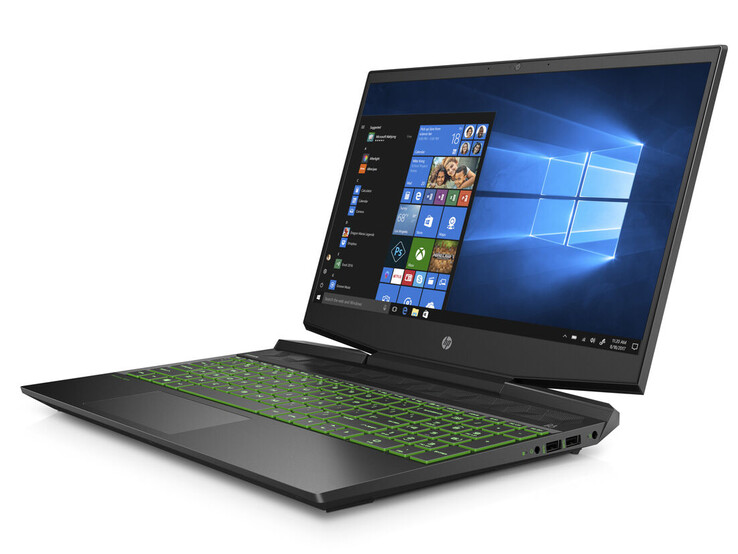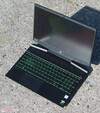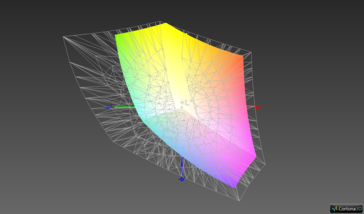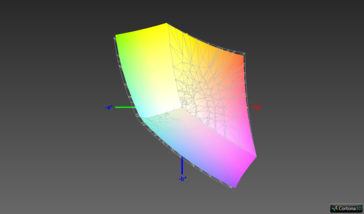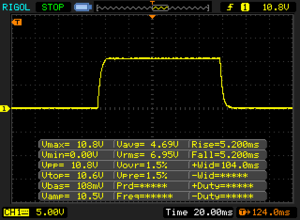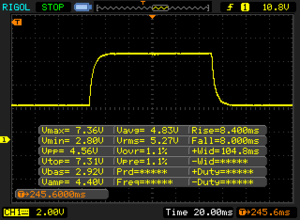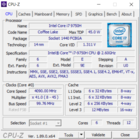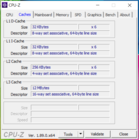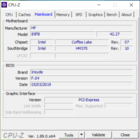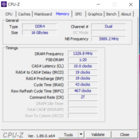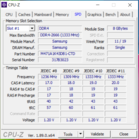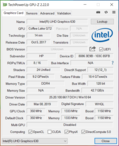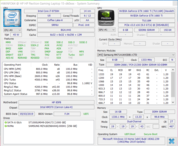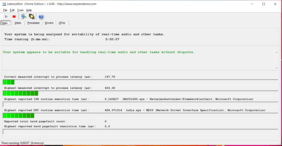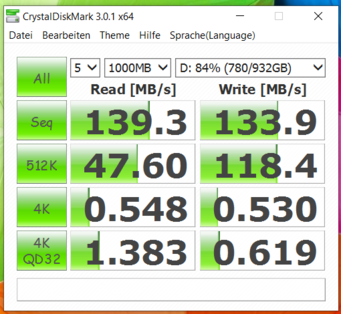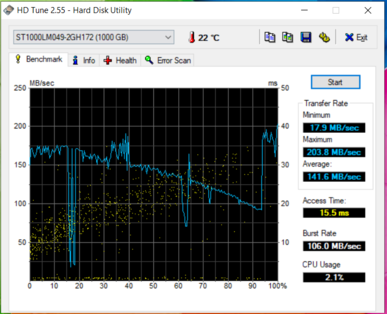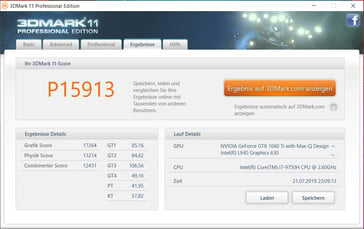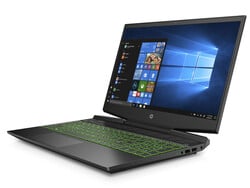Courte critique du HP Gaming Pavilion 15 (i7-9750H, GTX 1660 Ti Max-Q, FHD, 144 Hz) : un portable de jeu puissant et discret
Top 10
» Le Top 10 des PC portables multimédia
» Le Top 10 des PC portables de jeu
» Le Top 10 des PC portables de jeu légers
» Le Top 10 des ordinateurs portables bureautiques
» Le Top 10 des PC portables bureautiques premium/professionnels
» Le Top 10 des Stations de travail mobiles
» Le Top 10 des Ultraportables
» Le Top 10 des Ultrabooks
» Le Top 10 des Convertibles
» Le Top 10 des Tablettes
» Le Top 10 des Tablettes Windows
» Le Top 10 des Smartphones
» Le Top 10 des PC Portables á moins de 300 euros
» Le Top 10 des PC Portables á moins de 500 euros
» Le Top 25 des meilleurs écrans d'ordinateurs
| SD Card Reader | |
| average JPG Copy Test (av. of 3 runs) | |
| Moyenne de la classe Gaming (19 - 197.3, n=68, 2 dernières années) | |
| CUK Model Z GK5CQ7Z (Toshiba Exceria Pro SDXC 64 GB UHS-II) | |
| HP Gaming Pavilion 15-dk0009ng (Toshiba Exceria Pro SDXC 64 GB UHS-II) | |
| Dell G5 15 5590 (Toshiba Exceria Pro SDXC 64 GB UHS-II) | |
| Medion Erazer X6805-MD61085 (Toshiba Exceria Pro SDXC 64 GB UHS-II) | |
| maximum AS SSD Seq Read Test (1GB) | |
| Moyenne de la classe Gaming (25.8 - 263, n=67, 2 dernières années) | |
| CUK Model Z GK5CQ7Z (Toshiba Exceria Pro SDXC 64 GB UHS-II) | |
| HP Gaming Pavilion 15-dk0009ng (Toshiba Exceria Pro SDXC 64 GB UHS-II) | |
| Medion Erazer X6805-MD61085 (Toshiba Exceria Pro SDXC 64 GB UHS-II) | |
| Dell G5 15 5590 (Toshiba Exceria Pro SDXC 64 GB UHS-II) | |
| |||||||||||||||||||||||||
Homogénéité de la luminosité: 86 %
Valeur mesurée au centre, sur batterie: 346 cd/m²
Contraste: 821:1 (Valeurs des noirs: 0.42 cd/m²)
ΔE Color 1.3 | 0.5-29.43 Ø4.87, calibrated: 1.1
ΔE Greyscale 1.2 | 0.5-98 Ø5.1
94.9% sRGB (Argyll 1.6.3 3D)
60.5% AdobeRGB 1998 (Argyll 1.6.3 3D)
65.8% AdobeRGB 1998 (Argyll 2.2.0 3D)
95.1% sRGB (Argyll 2.2.0 3D)
64.2% Display P3 (Argyll 2.2.0 3D)
Gamma: 2.31
| HP Gaming Pavilion 15-dk0009ng IPS, 1920x1080, 15.6" | CUK Model Z GK5CQ7Z IPS, 1920x1080, 15.6" | Dell G5 15 5590 IPS, 1920x1080, 15.6" | Asus ROG Zephyrus G15 GA502DU IPS, 1920x1080, 15.6" | Lenovo Legion Y530-15ICH IPS, 1920x1080, 15.6" | Medion Erazer X6805-MD61085 IPS, 1920x1080, 15.6" | |
|---|---|---|---|---|---|---|
| Display | -1% | -38% | -37% | -3% | -7% | |
| Display P3 Coverage | 64.2 | 64.5 0% | 39.26 -39% | 40.33 -37% | 62.5 -3% | 63.8 -1% |
| sRGB Coverage | 95.1 | 93 -2% | 59.1 -38% | 60.6 -36% | 93 -2% | 82.4 -13% |
| AdobeRGB 1998 Coverage | 65.8 | 65.7 0% | 40.56 -38% | 41.69 -37% | 63.8 -3% | 60.3 -8% |
| Response Times | 1% | -181% | -138% | 2% | -158% | |
| Response Time Grey 50% / Grey 80% * | 16.4 ? | 13.6 ? 17% | 45 ? -174% | 34 ? -107% | 15 ? 9% | 38.4 ? -134% |
| Response Time Black / White * | 10.4 ? | 12 ? -15% | 30 ? -188% | 28 ? -169% | 11 ? -6% | 29.2 ? -181% |
| PWM Frequency | 21280 ? | 20490 ? | ||||
| Screen | -44% | -181% | -117% | -70% | -91% | |
| Brightness middle | 345 | 306.8 -11% | 234 -32% | 240.1 -30% | 305 -12% | 270 -22% |
| Brightness | 324 | 309 -5% | 219 -32% | 231 -29% | 284 -12% | 269 -17% |
| Brightness Distribution | 86 | 87 1% | 82 -5% | 85 -1% | 83 -3% | 86 0% |
| Black Level * | 0.42 | 0.38 10% | 0.17 60% | 0.34 19% | 0.52 -24% | 0.32 24% |
| Contrast | 821 | 807 -2% | 1376 68% | 706 -14% | 587 -29% | 844 3% |
| Colorchecker dE 2000 * | 1.3 | 3.16 -143% | 8.6 -562% | 4.2 -223% | 3.63 -179% | 5.1 -292% |
| Colorchecker dE 2000 max. * | 2.8 | 6.05 -116% | 17.49 -525% | 17.8 -536% | 8.18 -192% | 9.25 -230% |
| Colorchecker dE 2000 calibrated * | 1.1 | 2.4 -118% | 4.06 -269% | 4.09 -272% | 1.31 -19% | 3.25 -195% |
| Greyscale dE 2000 * | 1.2 | 2.3 -92% | 8.55 -613% | 2.8 -133% | 4.77 -298% | 4.16 -247% |
| Gamma | 2.31 95% | 2.17 101% | 3.02 73% | 2.2 100% | 2.54 87% | 2.53 87% |
| CCT | 6476 100% | 6557 99% | 7802 83% | 6925 94% | 7500 87% | 6860 95% |
| Color Space (Percent of AdobeRGB 1998) | 60.5 | 60 -1% | 37 -39% | 38.4 -37% | 59 -2% | 54 -11% |
| Color Space (Percent of sRGB) | 94.9 | 92.6 -2% | 59 -38% | 60.4 -36% | 93 -2% | 82 -14% |
| Moyenne finale (programmes/paramètres) | -15% /
-30% | -133% /
-154% | -97% /
-105% | -24% /
-49% | -85% /
-84% |
* ... Moindre est la valeur, meilleures sont les performances
Temps de réponse de l'écran
| ↔ Temps de réponse noir à blanc | ||
|---|---|---|
| 10.4 ms ... hausse ↗ et chute ↘ combinées | ↗ 5.2 ms hausse | |
| ↘ 5.2 ms chute | ||
| L'écran montre de bons temps de réponse, mais insuffisant pour du jeu compétitif. En comparaison, tous les appareils testés affichent entre 0.1 (minimum) et 240 (maximum) ms. » 25 % des appareils testés affichent de meilleures performances. Cela signifie que les latences relevées sont meilleures que la moyenne (20.8 ms) de tous les appareils testés. | ||
| ↔ Temps de réponse gris 50% à gris 80% | ||
| 16.4 ms ... hausse ↗ et chute ↘ combinées | ↗ 8.4 ms hausse | |
| ↘ 8 ms chute | ||
| L'écran montre de bons temps de réponse, mais insuffisant pour du jeu compétitif. En comparaison, tous les appareils testés affichent entre 0.165 (minimum) et 636 (maximum) ms. » 28 % des appareils testés affichent de meilleures performances. Cela signifie que les latences relevées sont meilleures que la moyenne (32.5 ms) de tous les appareils testés. | ||
Scintillement / MLI (Modulation de largeur d'impulsion)
| Scintillement / MLI (Modulation de largeur d'impulsion) non décelé | |||
En comparaison, 53 % des appareils testés n'emploient pas MDI pour assombrir leur écran. Nous avons relevé une moyenne à 8516 (minimum : 5 - maximum : 343500) Hz dans le cas où une MDI était active. | |||
| Geekbench 3 | |
| 32 Bit Multi-Core Score | |
| HP Gaming Pavilion 15-dk0009ng | |
| Moyenne Intel Core i7-9750H (21185 - 23587, n=8) | |
| Dell G5 15 5590 | |
| 32 Bit Single-Core Score | |
| HP Gaming Pavilion 15-dk0009ng | |
| Moyenne Intel Core i7-9750H (4137 - 4428, n=8) | |
| Dell G5 15 5590 | |
| Mozilla Kraken 1.1 - Total | |
| Dell G5 15 5590 (Edge 44) | |
| HP Gaming Pavilion 15-dk0009ng (Edge 44) | |
| Moyenne Intel Core i7-9750H (845 - 1713, n=54) | |
| Lenovo Legion Y530-15ICH | |
| Moyenne de la classe Gaming (409 - 674, n=139, 2 dernières années) | |
| Octane V2 - Total Score | |
| Moyenne de la classe Gaming (69893 - 130140, n=46, 2 dernières années) | |
| Lenovo Legion Y530-15ICH | |
| HP Gaming Pavilion 15-dk0009ng (Edge 44) | |
| Moyenne Intel Core i7-9750H (22874 - 39708, n=47) | |
| Dell G5 15 5590 (Edge 44) | |
| Asus ROG Zephyrus G15 GA502DU (Edge 44.17763.1.0) | |
| JetStream 1.1 - Total Score | |
| Moyenne de la classe Gaming (357 - 669, n=26, 2 dernières années) | |
| HP Gaming Pavilion 15-dk0009ng (Edge 44) | |
| Moyenne Intel Core i7-9750H (212 - 280, n=47) | |
| Dell G5 15 5590 (Edge 44) | |
| Asus ROG Zephyrus G15 GA502DU (Edge 44.17763.1.0) | |
| Lenovo Legion Y530-15ICH | |
* ... Moindre est la valeur, meilleures sont les performances
| PCMark 7 Score | 6847 points | |
| PCMark 8 Home Score Accelerated v2 | 4362 points | |
| PCMark 8 Creative Score Accelerated v2 | 4155 points | |
| PCMark 8 Work Score Accelerated v2 | 5608 points | |
| PCMark 10 Score | 5583 points | |
Aide | ||
| HP Gaming Pavilion 15-dk0009ng Samsung SSD PM981 MZVLB256HAHQ | CUK Model Z GK5CQ7Z Intel SSD 660p 2TB SSDPEKNW020T8 | Dell G5 15 5590 KBG30ZMS128G | Asus ROG Zephyrus G15 GA502DU Intel SSD 660p SSDPEKNW512G8 | Lenovo Legion Y530-15ICH Samsung SSD PM981 MZVLB256HAHQ | Medion Erazer X6805-MD61085 Samsung PM961 MZVLW256HEHP | Moyenne Samsung SSD PM981 MZVLB256HAHQ | |
|---|---|---|---|---|---|---|---|
| CrystalDiskMark 5.2 / 6 | 37% | -56% | -6% | 2% | -9% | 72% | |
| Write 4K | 100 | 134.4 34% | 64.3 -36% | 132.2 32% | 108.9 9% | 90.3 -10% | 116.1 ? 16% |
| Read 4K | 31.39 | 56.8 81% | 29.3 -7% | 55.5 77% | 40.23 28% | 38.98 24% | 189.5 ? 504% |
| Write Seq | 1308 | 1742 33% | 131.1 -90% | 986 -25% | 1390 6% | 1095 -16% | 1409 ? 8% |
| Read Seq | 1083 | 1687 56% | 776 -28% | 1318 22% | 964 -11% | 777 -28% | 1624 ? 50% |
| Write 4K Q32T1 | 362.9 | 535 47% | 96.8 -73% | 220.3 -39% | 314.2 -13% | 302.7 -17% | 360 ? -1% |
| Read 4K Q32T1 | 425.7 | 639 50% | 198.6 -53% | 315.5 -26% | 369.2 -13% | 352.2 -17% | 396 ? -7% |
| Write Seq Q32T1 | 1411 | 1903 35% | 127.8 -91% | 987 -30% | 1506 7% | 1265 -10% | 1492 ? 6% |
| Read Seq Q32T1 | 3240 | 1849 -43% | 1044 -68% | 1416 -56% | 3446 6% | 3389 5% | 3313 ? 2% |
| 3DMark 06 Standard Score | 38536 points | |
| 3DMark 11 Performance | 15913 points | |
| 3DMark Ice Storm Standard Score | 117976 points | |
| 3DMark Cloud Gate Standard Score | 33027 points | |
| 3DMark Fire Strike Score | 11615 points | |
| 3DMark Time Spy Score | 5072 points | |
Aide | ||
| The Witcher 3 - 1920x1080 Ultra Graphics & Postprocessing (HBAO+) | |
| Moyenne de la classe Gaming (18.4 - 214, n=119, 2 dernières années) | |
| CUK Model Z GK5CQ7Z | |
| Dell G5 15 5590 | |
| HP Gaming Pavilion 15-dk0009ng | |
| Moyenne NVIDIA GeForce GTX 1660 Ti Max-Q (44.8 - 53.2, n=7) | |
| Asus ROG Zephyrus G15 GA502DU | |
| Lenovo Legion Y530-15ICH | |
| Medion Erazer X6805-MD61085 | |
| BioShock Infinite - 1920x1080 Ultra Preset, DX11 (DDOF) | |
| CUK Model Z GK5CQ7Z | |
| Dell G5 15 5590 | |
| HP Gaming Pavilion 15-dk0009ng | |
| Moyenne NVIDIA GeForce GTX 1660 Ti Max-Q (102.3 - 130, n=5) | |
| Lenovo Legion Y530-15ICH | |
| Asus ROG Zephyrus G15 GA502DU | |
| Far Cry 5 - 1920x1080 Ultra Preset AA:T | |
| Moyenne de la classe Gaming (34 - 218, n=76, 2 dernières années) | |
| Dell G5 15 5590 | |
| HP Gaming Pavilion 15-dk0009ng | |
| Moyenne NVIDIA GeForce GTX 1660 Ti Max-Q (50 - 74, n=2) | |
| Bas | Moyen | Élevé | Ultra | |
|---|---|---|---|---|
| BioShock Infinite (2013) | 294 | 271.9 | 246.8 | 126.3 |
| GTA V (2015) | 161.3 | 151.5 | 114.6 | 59.6 |
| The Witcher 3 (2015) | 243 | 162.6 | 95.2 | 53.1 |
| Rainbow Six Siege (2015) | 232.8 | 200.1 | 163.6 | 148.8 |
| Ghost Recon Wildlands (2017) | 130.4 | 78.1 | 72.4 | 41.5 |
| Final Fantasy XV Benchmark (2018) | 106.4 | 70.3 | 50 | |
| Kingdom Come: Deliverance (2018) | 125.6 | 91.7 | 77.3 | 53.7 |
| X-Plane 11.11 (2018) | 102.3 | 88.1 | 75.4 | |
| Far Cry 5 (2018) | 103 | 84 | 79 | 74 |
| Assassin´s Creed Odyssey (2018) | 90 | 71 | 60 | 44 |
| Battlefield V (2018) | 117.4 | 74.6 | 65.9 | 61 |
| Far Cry New Dawn (2019) | 97 | 81 | 78 | 71 |
| Dirt Rally 2.0 (2019) | 194.2 | 139.9 | 103.2 | 59.2 |
| The Division 2 (2019) | 142 | 87 | 69 | 50 |
| Anno 1800 (2019) | 87.9 | 83.2 | 64.1 | 33.2 |
| Rage 2 (2019) | 154.7 | 70.9 | 58.7 | 58.2 |
| Total War: Three Kingdoms (2019) | 209.4 | 93.1 | 57.1 | 41.6 |
| F1 2019 (2019) | 183 | 140 | 117 | 71 |
Degré de la nuisance sonore
| Au repos |
| 29.3 / 29.3 / 29.3 dB(A) |
| Disque dur |
| 29.7 dB(A) |
| Fortement sollicité |
| 32.3 / 41.2 dB(A) |
 | ||
30 dB silencieux 40 dB(A) audible 50 dB(A) bruyant |
||
min: | ||
| HP Gaming Pavilion 15-dk0009ng i7-9750H, GeForce GTX 1660 Ti Max-Q | CUK Model Z GK5CQ7Z i7-9750H, GeForce RTX 2070 Max-Q | Dell G5 15 5590 i7-8750H, GeForce RTX 2060 Mobile | Asus ROG Zephyrus G15 GA502DU R7 3750H, GeForce GTX 1660 Ti Max-Q | Lenovo Legion Y530-15ICH i7-8750H, GeForce GTX 1060 Mobile | Medion Erazer X6805-MD61085 i7-8750H, GeForce GTX 1060 Mobile | Moyenne NVIDIA GeForce GTX 1660 Ti Max-Q | Moyenne de la classe Gaming | |
|---|---|---|---|---|---|---|---|---|
| Noise | -23% | -13% | -20% | -9% | -20% | -5% | -4% | |
| arrêt / environnement * | 28.2 | 28.6 -1% | 30.4 -8% | 28 1% | 30.2 -7% | 29 -3% | 28.3 ? -0% | 24 ? 15% |
| Idle Minimum * | 29.3 | 30.8 -5% | 30.4 -4% | 29.4 -0% | 30.9 -5% | 29 1% | 29.2 ? -0% | 25.6 ? 13% |
| Idle Average * | 29.3 | 30.8 -5% | 30.4 -4% | 31.9 -9% | 30.9 -5% | 32 -9% | 29.5 ? -1% | 27.2 ? 7% |
| Idle Maximum * | 29.3 | 35 -19% | 33.4 -14% | 33 -13% | 31.6 -8% | 35 -19% | 30.4 ? -4% | 30.1 ? -3% |
| Load Average * | 32.3 | 45 -39% | 42 -30% | 41.2 -28% | 42.3 -31% | 45 -39% | 37.3 ? -15% | 41.7 ? -29% |
| Witcher 3 ultra * | 34 | 51.6 -52% | 53.8 -58% | 47 -38% | ||||
| Load Maximum * | 41.2 | 57.8 -40% | 48.7 -18% | 55.7 -35% | 40 3% | 56 -36% | 46.1 ? -12% | 53.3 ? -29% |
* ... Moindre est la valeur, meilleures sont les performances
(-) La température maximale du côté supérieur est de 46.7 °C / 116 F, par rapport à la moyenne de 40.4 °C / 105 F, allant de 21.2 à 68.8 °C pour la classe Gaming.
(-) Le fond chauffe jusqu'à un maximum de 53.7 °C / 129 F, contre une moyenne de 43.2 °C / 110 F
(+) En utilisation inactive, la température moyenne du côté supérieur est de 23.4 °C / 74 F, par rapport à la moyenne du dispositif de 33.9 °C / 93 F.
(-) En jouant à The Witcher 3, la température moyenne du côté supérieur est de 38.8 °C / 102 F, alors que la moyenne de l'appareil est de 33.9 °C / 93 F.
(+) Les repose-poignets et le pavé tactile atteignent la température maximale de la peau (33.3 °C / 91.9 F) et ne sont donc pas chauds.
(-) La température moyenne de la zone de l'appui-paume de dispositifs similaires était de 28.9 °C / 84 F (-4.4 °C / #-7.9 F).
| HP Gaming Pavilion 15-dk0009ng i7-9750H, GeForce GTX 1660 Ti Max-Q | CUK Model Z GK5CQ7Z i7-9750H, GeForce RTX 2070 Max-Q | Dell G5 15 5590 i7-8750H, GeForce RTX 2060 Mobile | Asus ROG Zephyrus G15 GA502DU R7 3750H, GeForce GTX 1660 Ti Max-Q | Lenovo Legion Y530-15ICH i7-8750H, GeForce GTX 1060 Mobile | Medion Erazer X6805-MD61085 i7-8750H, GeForce GTX 1060 Mobile | Moyenne NVIDIA GeForce GTX 1660 Ti Max-Q | Moyenne de la classe Gaming | |
|---|---|---|---|---|---|---|---|---|
| Heat | -38% | -8% | -27% | -5% | -10% | -12% | -15% | |
| Maximum Upper Side * | 46.7 | 47.2 -1% | 51.5 -10% | 55.8 -19% | 48.4 -4% | 43 8% | 46.6 ? -0% | 46.2 ? 1% |
| Maximum Bottom * | 53.7 | 65.8 -23% | 48.3 10% | 58.2 -8% | 48 11% | 55 -2% | 49.4 ? 8% | 49.5 ? 8% |
| Idle Upper Side * | 23.8 | 35.2 -48% | 27.2 -14% | 33.4 -40% | 26.7 -12% | 28 -18% | 30.1 ? -26% | 31.4 ? -32% |
| Idle Bottom * | 23.7 | 43 -81% | 27.4 -16% | 33.6 -42% | 26.9 -14% | 30 -27% | 31 ? -31% | 32.6 ? -38% |
* ... Moindre est la valeur, meilleures sont les performances
HP Gaming Pavilion 15-dk0009ng analyse audio
(±) | le niveau sonore du haut-parleur est moyen mais bon (75.8# dB)
Basses 100 - 315 Hz
(-) | presque aucune basse - en moyenne 23.1% plus bas que la médiane
(±) | la linéarité des basses est moyenne (11.6% delta à la fréquence précédente)
Médiums 400 - 2000 Hz
(+) | médiane équilibrée - seulement 2.4% de la médiane
(+) | les médiums sont linéaires (5.4% delta à la fréquence précédente)
Aiguës 2 - 16 kHz
(+) | des sommets équilibrés - à seulement 1.5% de la médiane
(+) | les aigus sont linéaires (3.4% delta à la fréquence précédente)
Globalement 100 - 16 000 Hz
(±) | la linéarité du son global est moyenne (19% de différence avec la médiane)
Par rapport à la même classe
» 62% de tous les appareils testés de cette catégorie étaient meilleurs, 8% similaires, 30% pires
» Le meilleur avait un delta de 6%, la moyenne était de 18%, le pire était de 132%.
Par rapport à tous les appareils testés
» 42% de tous les appareils testés étaient meilleurs, 8% similaires, 50% pires
» Le meilleur avait un delta de 4%, la moyenne était de 24%, le pire était de 134%.
| Éteint/en veille | |
| Au repos | |
| Fortement sollicité |
|
Légende:
min: | |
| HP Gaming Pavilion 15-dk0009ng i7-9750H, GeForce GTX 1660 Ti Max-Q | CUK Model Z GK5CQ7Z i7-9750H, GeForce RTX 2070 Max-Q | Dell G5 15 5590 i7-8750H, GeForce RTX 2060 Mobile | Asus ROG Zephyrus G15 GA502DU R7 3750H, GeForce GTX 1660 Ti Max-Q | Lenovo Legion Y530-15ICH i7-8750H, GeForce GTX 1060 Mobile | Medion Erazer X6805-MD61085 i7-8750H, GeForce GTX 1060 Mobile | Moyenne NVIDIA GeForce GTX 1660 Ti Max-Q | Moyenne de la classe Gaming | |
|---|---|---|---|---|---|---|---|---|
| Power Consumption | -101% | 15% | -23% | -5% | -25% | 12% | -66% | |
| Idle Minimum * | 6.8 | 23.5 -246% | 3.5 49% | 7.4 -9% | 7.3 -7% | 10 -47% | 5.16 ? 24% | 13.4 ? -97% |
| Idle Average * | 10.7 | 28 -162% | 6.9 36% | 8.6 20% | 11.1 -4% | 13 -21% | 8.51 ? 20% | 18.9 ? -77% |
| Idle Maximum * | 12.5 | 32 -156% | 8.5 32% | 39.1 -213% | 12.6 -1% | 21 -68% | 14.6 ? -17% | 26.3 ? -110% |
| Load Average * | 87.2 | 102.4 -17% | 127 -46% | 65.9 24% | 109 -25% | 101 -16% | 76.4 ? 12% | 102.7 ? -18% |
| Witcher 3 ultra * | 121 | 142.8 -18% | 106.9 12% | 126 -4% | ||||
| Load Maximum * | 191.4 | 209 -9% | 179 6% | 141.3 26% | 168 12% | 176 8% | 151.4 ? 21% | 244 ? -27% |
* ... Moindre est la valeur, meilleures sont les performances
| HP Gaming Pavilion 15-dk0009ng i7-9750H, GeForce GTX 1660 Ti Max-Q, 52.5 Wh | CUK Model Z GK5CQ7Z i7-9750H, GeForce RTX 2070 Max-Q, 46.74 Wh | Dell G5 15 5590 i7-8750H, GeForce RTX 2060 Mobile, 60 Wh | Asus ROG Zephyrus G15 GA502DU R7 3750H, GeForce GTX 1660 Ti Max-Q, 76 Wh | Lenovo Legion Y530-15ICH i7-8750H, GeForce GTX 1060 Mobile, 52 Wh | Medion Erazer X6805-MD61085 i7-8750H, GeForce GTX 1060 Mobile, 46.7 Wh | Moyenne de la classe Gaming | |
|---|---|---|---|---|---|---|---|
| Autonomie de la batterie | -39% | 78% | 68% | -31% | 6% | 24% | |
| Reader / Idle | 522 | 890 70% | 916 75% | 495 -5% | 503 -4% | 585 ? 12% | |
| H.264 | 317 | 506 60% | 447 ? 41% | ||||
| WiFi v1.3 | 290 | 178 -39% | 463 60% | 482 66% | 228 -21% | 270 -7% | 387 ? 33% |
| Witcher 3 ultra | 60 | 74.7 ? 25% | |||||
| Load | 76 | 168 121% | 123 62% | 26 -66% | 98 29% | 84.5 ? 11% |
Points positifs
Points négatifs
Le HP Gaming Pavilion 15 fait ce pour quoi il est conçu, et affiche de façon fluide tous les jeux triple A modernes sur son écran 1080p de 15,6 pouces. Le Core i7-9750H et la GeForce GTX 1660 Ti Max-Q s’avèrent être une combinaison puissante, de celle qui permet d’exploiter les 144 Hz de la dalle aux graphismes maximaux dans certains jeux. Le Gaming Pavilion 15 tourne de façon plutôt silencieuse, le bruit de ses ventilateurs ne couvrant pas les haut-parleurs durant le jeu.
Le SSD NVMe rapide permet au système de rester fluide et réactif, tandis que l’espace pour les jeux ne devrait pas manquer, grâce à la présence d’un disque dur de 1 To. Mieux encore, les deux disques peuvent être remplacés – même s’il faudra retirer la coque inférieure pour pouvoir le faire.
Le HP Gaming Pavilion 15 est une machine polyvalente honnête, pour laquelle nous avons peu de critiques.
L’écran IPS marque des points, non seulement grâce à son taux de rafraîchissement de 144 Hz, mais également grâce à ses faibles temps de réponse, à ses bons angles de vision, à sa luminosité maximale élevée, et à des couleurs très fidèles. Tout n’est pas excellent, la valeur des noirs comparativement élevée débouchant sur un contraste vraiment faible. Nous en attendions plus d’un appareil de cette classe à ce prix.
Le Gaming Pavilion 15 ne séduira pas non plus par son autonomie, celle-ci n’étant que de 4h30 dans notre test Wifi réaliste - cela n’est pas une surprise vu sa capacité de seulement 52,6 Wh. Nos ultimes critiques se font à l’encontre d’absence de Thunderbolt 3, d’une partie écran peu stable, et de la garantie d’un an. En revanche le clavier rétroéclairé est agréable, et les nombreux ports pratiques. Dans l’ensemble, le Gaming Pavilion 15 possède un bon rapport qualité / prix, à environ 1 500 $, avec ses ventilateurs silencieux comme point fort.
L’intégralité de cette critique est disponible en anglais en suivant ce lien.
HP Gaming Pavilion 15-dk0009ng
- 09/20/2019 v7 (old)
Sascha Mölck




